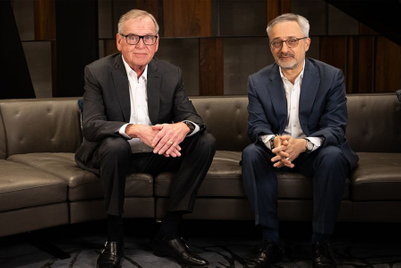
In the past month alone, Publicis and Omnicom have lost more than US$1.5 billion in client work, according to Reuters estimates, and are fighting to retain billions more including Samsung’s huge contract.
In April, Omnicom lost Vodafone’s $1 billion global media and buying account to GroupM, and Microsoft moved its advertising and media business from Publicis and WPP to Dentsu Aegis and Interpublic. According to Reuters, others to move away from Publicis or Omnicom recently include Danone, GSK, Sony and Marks & Spencer.
Publicis Group CEO Maurice Levy’s statement today seems to support industry speculation that the merger was having an adverse effect on client relationships. "Prolonging the situation could have led to the diversion of the group's management from its principle function: to best serve our clients," Levy was quoted saying.
“One of the first things Sir Martin Sorrell said when the merger was announced was that it was a good opportunity for WPP, and that’s been borne out," said Nick Waters, CEO of Dentsu Aegis Network Asia-Pacific. "It’s also been good for Dentsu Aegis Network; we’ve benefited from POG losing business. In fact, I’d rather hoped it would drag on till a merger in 2015, after which they would spend the next two years fighting each other. We were quite looking forward to it.”
Sadly, said Sorrell, that was never likely, but competitors had hoped the groups would apply for an extension on July 27. "We would have loved for it to have gone on for longer, but there will be further disruptions as a result of this decision," he said. "When an event like that happens it raises a lot of questions and causes a lot of turmoil. So far there also hasn't been a great amount of humility being shown by either party."
Certainly the merger caused a great deal of distraction for the two holding companies, and while this may not have directly affected client work, it may have made some nervous. “If you’re Microsoft and you’re with Starcom in the US and its holding company was about to merge with Omnicom, which has significant Apple relationships, it raises questions,” said Waters.
Conversely now that the merger has been called off, the two agencies will get back to the business of doing business, he added. Clients are unlikely to be affected by the un-merger as it was driven by those at the top of the holding companies. “People who ran the agencies were entirely ambivalent about the merger,” said Waters.
Greg Paull, principal of R3, believes that most clients will be relieved by the news of the unmerger. “There were a number of potentially sticky Coke/Pepsi, Unilever/Nestle and Samsung/Apples under one roof that no side was looking forward to,” he said.
It also hasn’t helped client confidence that from the beginning, few thought the merger made any sense for clients, for the agencies or for shareholders. “It was an odd marriage of star-crossed lovers from the start,” Paull said. “The main reason for the move—gaining clout with digital media—was never thoroughly investigated or validated.”
“The logic for it was never really explained, strategically or structurally and there were issues coming from that, obviously," Sorrell told Campaign Asia-Pacific this morning. "They tried to say they would be equally good separately as together and that begs the question ‘Why bother to bring it together?'"
The tax and regulatory issues cited as reasons for the breakup could have been overcome, Sorrell continued. "I think those are excuses because basically the deal was an emotional deal," he said. "It wasn’t a logical or rational deal. It wasn’t done for strategic reasons. It wasn’t done for client reasons. It wasn’t done for people reasons. It was done by two people sitting in a room for six months without, as they said at the time, expensive advisers. Maybe they should have had some expensive advisers in the room.”
Signs that the deal was unravelling at the seams started early in the year, with industry rumours that Publicis and Omnicom were not planning on merging their media agencies despite the growth of new media giants Facebook and Google, which had been presented as the main reason for the deal. The lack of cooperation between Publicis-owned Vivaki and ZenithOptimedia never boded well for a potential merger with Omnicom Media Group, Waters said.
According to Sorrell, an Omnicom executive said that "smoke signals were going up that it wasn't going to happen" as far back as December. "It wasn't just media, it was digital too," Sorrell said. "They were never going to agree among themselves to what degree, to whom... who the CFO was going to be."
The only reason the decision was made in the first place, bandied Sorrell, was Levy "seducing" Wren with his "gallic charm". Or that Wren initially understood that larger Omnicom would be acquiring Publicis. This understanding went up in flames when French daily Le Monde, which Sorrell described as a "mouthpiece for Maurice", stated that it was Publicis that would be acquiring Omnicom. "I think it was the last nail in the coffin," said Sorrell.
A highly placed ex-Publicis executive commented that before the merger was fully planned out, the passion to beat WPP led the two groups to overlook their differences. "A one-night stand is so easy, but when it's a wedding... if you have to sit with each other for a meal every day and share a bathroom, it's a different story," he said.
Although a few top executives may lose credibility over this, calling off the merger is by and large a sensible move, said Darren Woolley, managing director of TrinityP3. “The fact is that agencies rely on the goodwill and support of their clients. In this case I think most clients could not see the benefit, and many were concerned over conflicts and becoming less relevant to an ever increasingly powerful holding company.”
See also: "OmniPub bromance didn't extend to the CFOs' offices", from PRWeek.


.jpg&h=334&w=500&q=100&v=20250320&c=1)
.jpg&h=334&w=500&q=100&v=20250320&c=1)

.png&h=334&w=500&q=100&v=20250320&c=1)

.png&h=334&w=500&q=100&v=20250320&c=1)

.jpg&h=334&w=500&q=100&v=20250320&c=1)



.jpg&h=268&w=401&q=100&v=20250320&c=1)





.png&h=268&w=401&q=100&v=20250320&c=1)